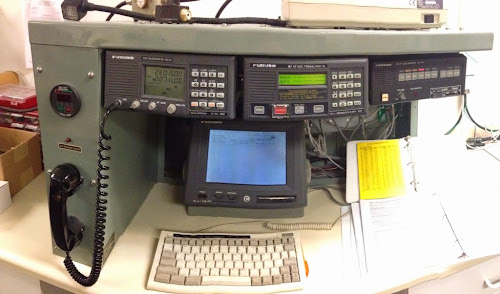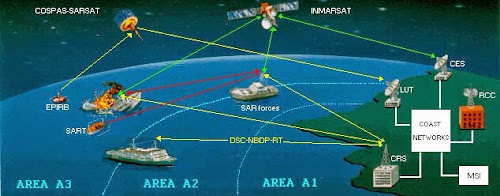Well, today I wrapped up week two of GMDSS with a nasty bang, indicating the implosion of my mind. I tested yesterday for my final assessments, missing a few steps and forcing a retake on a few things today. I studied all night, and again early this morning, feeling really good about the re-take. But when it came down to test time, my fatigue and fried memory from 11+ days of studying got the best of me and I dropped the ball on a few similar things, failing the test and the entire class.
It was probably the biggest academic disappointment of my entire life. I can retake the class, and there's no problem there, but the disappointment comes from having put SO much effort into something, only to fail in the end, something I'm not used to.
I'm not a "slow" learner and I typically pick things up fairly quick. I've spent a good portion of my life in classes from grade school up through radar school in the Navy, a Bachelors degree and through half of the Masters program at the CSU level. I've even spent a few extra years at the JC level for business development classes. During my undergrad time, I was on the deans list with 3.9 GPA and I'd like to believe that I have a pretty good handle on how to study with fairly productive study techniques. I will admit that yes, I'm older now and I have to assume that my mind isn't as sharp as it was 15 years ago, but I didn't see such a struggle on the horizon and was a caught a bit off guard.
This class didn't fall into any nice little box that prior experience would benefit me from. The material was interesting and applicable, but so damn language and acronym intensive, that I spent half of my time just trying to remember terminology, let alone general concepts. That, combined with too little time and an instructor who moves quickly from topic to topic, and I was left spinning around grasping for air.
I managed to pass the written test in week 1 with a minimal passing grade, but lab week was even more overwhelming and I couldn't commit to memory, the important steps and details of what was needed.
Over the 11 day period, I spent over 150 hours on the topic, studying after class, all-day on Saturday/Sunday, and it still didn't stick well enough to land me a passing grade. I even had numerous dreams about frequencies, vhf radio conversations and other class related topics. My point is, that I applied myself 200%, and that wasn't enough.
My other 4 lab classmates passed with similar effort, and my hat is off to them. 2 of our classmates from week 1 failed out during the first week, so I'm fortunate to have made it to lab week, but it still really sucks to end on such a bad note. I did manage to pass the Element 1 written test after I was done today, therefore qualifying me for my FCC license. At least I'll be getting something out of the class in addition to a headache and a few more gray hairs.
Frustration and disappointment is really an understatement, but that's life and we move on.
So, here I sit in an airport bar, enjoying an ice cold amber or 4, and waiting for my flight to take me home where family and sunshine will hopefully put the last 11 days behind me. I'll be back for more GMDSS, but not anytime soon. I have one year to take the class again, so I'm thinking somewhere out there around the 11.5 months-from-now timeframe should do the trick. I'm in no hurry to put myself into the hurt locker again that is called GMDSS.
Images from the class:
 |
| Typical Furuno GMDSS console |
 |
| Small, yet stressful classroom |
 |
| Standard Furuno VHF radios |
 |
| Inmarsat-C terminal |





